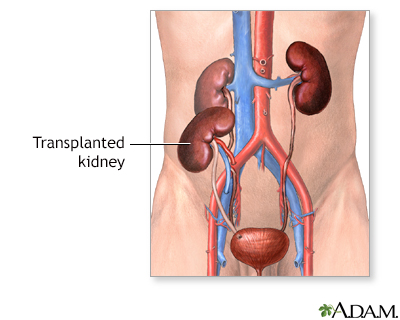Organ Transplant

What is an organ transplant?
An organ transplant is a surgical procedure that involves replacing a diseased or damaged organ with a healthy organ from a donor. Organ transplants can be life-saving for individuals with severe organ failure, but they also carry risks and require ongoing medical management.
Who's at risk for needing an organ transplant?
Any individual with severe organ damage or failure may be at risk for needing an organ transplant. Common reasons for organ failure that may require a transplant include:
- Kidney disease or failure
- Liver disease or failure
- Heart disease or failure
- Lung disease or failure
- Pancreatic disease or failure
What causes the need for an organ transplant?
The need for an organ transplant is usually caused by a chronic medical condition or disease that results in irreversible damage to an organ. Some common conditions that may lead to the need for an organ transplant include:
- Chronic kidney disease
- Cirrhosis of the liver
- Congenital heart defects
- Emphysema or other lung diseases
- Type 1 diabetes
How does the process of organ transplant work?
The process of organ transplant involves several steps, including:
- Evaluation of the individual in need of an organ transplant to determine the appropriate course of treatment and assess their overall health and medical history
- Identification of a suitable donor organ, either from a deceased or living donor
- Surgical removal of the diseased or damaged organ from the recipient and replacement with the donor organ
- Ongoing medical management and monitoring of the recipient to prevent complications and ensure the success of the transplant
What are the risks and benefits of organ transplant?
Organ transplant can offer a number of potential benefits, including improved quality of life and increased lifespan for individuals with severe organ failure. However, the procedure also carries risks, including:
- Rejection of the transplanted organ by the recipient's immune system
- Complications from surgery and anesthesia
- Side effects from immunosuppressive medications used to prevent rejection of the transplanted organ
- Development of infections or other complications
How are organ donors and recipients matched?
Matching of organ donors and recipients is based on a variety of factors, including:
- Blood and tissue type compatibility
- Geographic location of the donor and recipient
- Medical urgency of the transplant
- Length of time on the waiting list
How can I become an organ donor?
Individuals who wish to become organ donors can register to do so through their state's organ donor registry or through organizations such as Donate Life America. It is important to discuss one's wishes regarding organ donation with family members and loved ones to ensure that they are aware of one's wishes in the event of an unexpected medical emergency.
What is the long-term management of organ transplant?
Long-term management of organ transplant involves ongoing medical monitoring and management to ensure the success and longevity of the transplant. This may include:
- Regular checkups with a healthcare provider to monitor the function of the transplanted organ and assess for any complications
- Adherence to a strict medication regimen, including immunosuppressive medications to prevent rejection of the transplanted organ
- Avoidance of certain activities or exposures that may increase the risk of infection or other complications
- Adoption of healthy lifestyle habits, including regular exercise, a healthy diet, and avoidance of tobacco and excessive alcohol consumption
Where can I go for more information on organ transplants?
Resources for more information on organ transplants include the Organ Procurement and Transplantation Network, the United Network for Organ Sharing, and the National Institute of Diabetes and Digestive and Kidney Diseases. These organizations provide information on the organ transplant process, risks and benefits, living donation, and support resources for individuals and families affected by organ transplant. Additionally, consulting with a healthcare provider can provide personalized recommendations for managing the long-term care of a transplanted organ.

